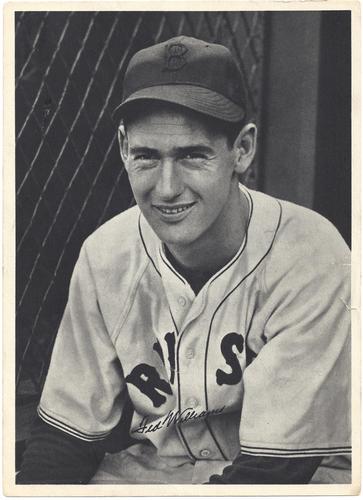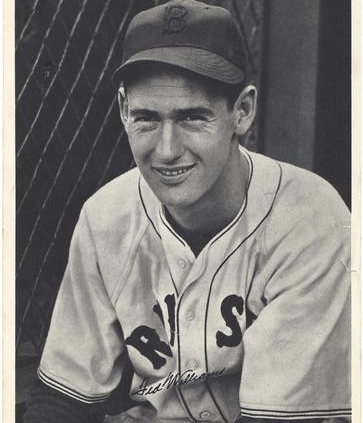July 5, 1940: Ted Williams gets a grip and homers to beat the Nationals
 Bucky Harris’s Washington Nationals had swept a Fourth of July 1940 doubleheader from the visiting Philadelphia Athletics. They were still in seventh place in the American League, though, as they welcomed the Boston Red Sox for a weekend series – single games on July 5 and 6, and a Sunday doubleheader on July 7. Their record stood at 29-43, 15 games out of first place.
Bucky Harris’s Washington Nationals had swept a Fourth of July 1940 doubleheader from the visiting Philadelphia Athletics. They were still in seventh place in the American League, though, as they welcomed the Boston Red Sox for a weekend series – single games on July 5 and 6, and a Sunday doubleheader on July 7. Their record stood at 29-43, 15 games out of first place.
The 38-30 Red Sox had been only three games behind the league-leading Cleveland Indians after their six-run ninth beat the Athletics on July 3, but they then dropped both games of their Independence Day doubleheader in Boston to the New York Yankees. After the holiday, the Red Sox were in third place, a game and a half ahead of the Yankees and three behind the second-place Detroit Tigers.
Harris gave Walt Masterson the game ball. The Nationals’ right-hander had turned 20 years old on June 22. He was 3-4 in his second season in the majors, with a 4.69 ERA. His last start had resulted in a loss to the Red Sox in Boston on June 30. He pitched well enough in the first inning in this rematch at Griffith Stadium, the only problem being an error behind him by shortstop Jimmy Pofahl.
Boston manager-shortstop Joe Cronin named Jim Bagby, Jr. as his pitcher. A 23-year-old righty, Bagby was in his third major-league season. The Athletics had hit him hard just four days before, getting to him for seven runs in 4 1/3 innings, a game the Red Sox lost, 9-1. Bagby brought a 5-6 record and a 4.50 ERA in the July 5 game. His father had pitched nine seasons in the majors between 1912 and 1923. Seven of them were for the Indians.
The first play of the game for the Washington offense was a bunt single by speedy center fielder George Case; Case had new life after left fielder Ted Williams dropped a foul ball hit to him. For Case, it was his seventh hit in a row. He had gone 9-for-10 in the July 4 doubleheader.1 Williams was charged with an error. Bagby walked first baseman Zeke Bonura, too, but he struck out third baseman Cecil Travis and the Indians were unable to score.
The Red Sox took a 3-0 lead in the top of the second. Right fielder Lou Finney singled to center field. Third baseman Jim Tabor fouled out. After Finney took second on a wild pitch, Cronin walked and catcher Gene Desautels singled, driving in Finney. Bagby helped with the bat; he singled and drove in Cronin from second base. Desautels scored the third run on a fly ball by second baseman Bobby Doerr.
Two Nationals reached base in their half of the second on a walk to Buddy Myer (second baseman) and a single by catcher Jake Early. Once again, they left two on base without scoring.
Jimmie Foxx hit a home run “into the distant left-field bleachers,” per the Boston Herald, to lead off the third for Boston, his 20th homer of the 1940 season and the 484th of his career.2 Ted Williams doubled – but was picked off second. The next three batters were retired. It was 4-0, Red Sox.
Right fielder Buddy Lewis singled as leadoff for the Nationals in the third. He advanced on an out, then scored when Travis hit a two-out single.
Neither team scored in the fourth inning. Cronin walked for Boston, and Masterson singled for Washington, but both were left on base.
With one out in the top of the fifth, Foxx doubled off the left-field wall. This brought up Ted Williams, who had that third-inning double to his credit but had also committed the first-inning fielding error and had been picked off second base. Masterson fooled him on one pitch, so badly that Williams swung hard but, as the Boston Globe remarked, completely missed it by “a mile and the bat slipped out of his hands, sailing clear out into right field for a new intercollegiate record for bat throwing.”3
No doubt angry with himself, Williams got a firmer grip on the bat and connected with the next pitch, one on which he “bashed his 11th homer over the garden wall in right,” driving in the fifth and sixth runs for the Red Sox.4 It was, wrote the Washington Evening Star, a “handle” hit. The paper said, “Had he caught it cleanly there’s no telling where it would have gone.”5 Boston led, 6-1.
Finney singled. Tabor doubled to left field, Finney scoring from first. Cronin singled – also to left – and Tabor scored. The Red Sox lead was now 8-1 After Lewis committed an error in right that allowed Desautels to reach base, Harris replaced his starter, bringing on Willis Hudlin in relief. Masterson had allowed eight runs at more or less the midpoint (4 1/3 innings). Hudlin allowed only one more Red Sox run the rest of the game. The first batter he faced was Bagby, who lined into a double play that ended Boston’s inning.
The Nationals got two runs back in the bottom of the fifth. Lewis singled. He was forced at second base but Bonura walked, putting runners on first and second. After a second out, Buddy Myer singled to center and drove in the team’s second run. Pofahl singled to left and drove in Bonura. Bagby struck out Jake Early. The score was 8-3 after five innings of play.
In the Red Sox sixth, Bobby Doerr doubled over Gee Walker’s head in left field and Foxx walked but both were left on base. The Nationals went down in order.
Jim Tabor tripled to lead off the seventh inning. Cronin followed him with a single. Desautels was hit by a pitch, but the next three Red Sox all made outs. Travis doubled for the Nationals but he was the only one who reached base.
In the eighth, Foxx made an out. Williams struck out. Lou Finney got the 14th hit of the game for the visitors, a triple that eluded Case’s attempt at a shoestring catch, but he was left on third.
The Nationals got one more run in the eighth – making it 9-4 – on a solo home run over the right-field wall by Jake Early.
Hudlin retired the three Red Sox batters he faced in the top of the ninth. The Nationals got two final base hits – a one-out single by Walker and a two-out single by Travis. Buddy Myer made the final out.
Bagby got the win, evening his record at 6-6. Masterson went to 3-5, and he didn’t win another game for the rest of the 1940 season; he ended the campaign with a record of 3-13 (4.90 ERA).
It wasn’t a well-played game. Shirley Povich of the Washington Post started his story saying that the Nationals simply “had out-disgraced the Red Sox.”6 The Nationals had 12 base hits (10 of them singles) to 14 by the Red Sox. Travis had three of the 12, two singles and a double. They left 11 men on base. Eight of Boston’s 14 hits were for extra bases. Williams and Foxx each had a double and a home run. The game-winning hit was Williams’s fifth-inning home run.7
Despite all the base hits, four errors, and five walks, the game played before a Friday afternoon “ladies day” crowd of around 6,000 in the nation’s capital was completed in 2 hours and 14 minutes.
Acknowledgments
This article was fact-checked by Harrison Golden and copy-edited by Len Levin.
Photo credit: Ted Williams, Trading Card Database.
Sources
In addition to the sources cited in the Notes, the author consulted Baseball-Reference.com and Retrosheet.org.
https://www.baseball-reference.com/boxes/WS1/WS1194007050.shtml
https://www.retrosheet.org/boxesetc/1940/B07050WS11940.htm
Notes
1 Case was 0-for-4 the rest of the game.
2 John Drohan, “Sox Set Off Fireworks Late, Blow Nats out of Park, 9-4,” Boston Herald, July 6, 1940: 6.
3 Hy Hurwitz, “Sox Trample Senators, 9-4,” Boston Globe, July 6, 1940: 7. The bat flew over first baseman Bonura’s head.
4 Drohan.
5 “Reporter Surprised to Hear Baseball Gab, Not Gossip, in Stands on Ladies’ Day,” Washington Evening Star, July 6, 1940: A14.
6 Shirley Povich, “Nats Beaten, 9-4, by Bosox Hard Hitting,” Washington Post, July 6, 1940: 11.
7 A “game-winning hit” is defined here as a hit that provides a game’s final margin of victory, giving the winning team at least one more run than the opposing team scored. For example, if a two-run homer increased a team’s lead from 2-1 to 4-1, and it went on to win 4-3, it qualifies as a game-winning home run. (This is different from the definition of “game-winning RBI” in baseball’s official statistics from 1980 through 1988, which counted as “game-winning” the RBI that provided a winning team the lead that it never relinquished.)
Additional Stats
Boston Red Sox 9
Washington Nationals 4
Griffith Stadium
Washington, DC
Box Score + PBP:
Corrections? Additions?
If you can help us improve this game story, contact us.


